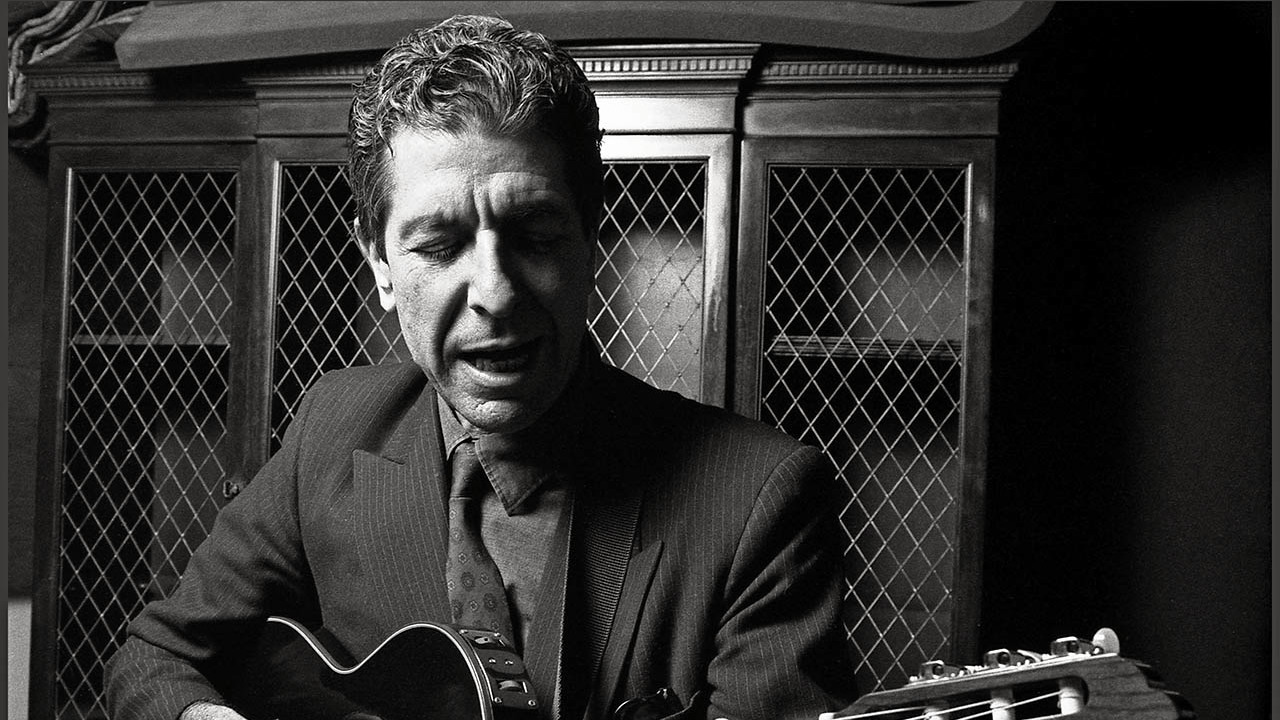A shattering loss even in a year marked by the demise of so many rock legends, Leonard Cohen’s death on November 7, at the age of 82, robs the music world of one of its greatest songwriters. But, like David Bowie before him, the poet laureate of sublime romantic melancholy bowed out after a blazing autumnal comeback, even anticipating his own death on his exquisite final album, You Want It Darker.
In a music career lasting half a century, Cohen’s influence on other musicians has been immeasurable. Bob Dylan and Nick Cave consider him an unrivalled Zen Master. “For many of us Leonard Cohen was the greatest songwriter of them all,” Cave said after news of his death broke. “Utterly unique and impossible to imitate no matter how hard we tried.”
Cohen’s songs have been covered by acolytes young and old including Johnny Cash, Joe Cocker, John Cale, R.E.M, Pixies and Jeff Buckley. Kurt Cobain paid lyrical homage to him in Nirvana’s Penny Royal Tea. The Sisters Of Mercy named themselves after one of his songs. His most fêted composition, Hallelujah, has inspired literally hundreds of copycat versions.
Born to affluent Jewish-Canadian parents in Montreal in 1934, Cohen grew up financially comfortable but spiritually bereft. His father’s death when he was nine was a key trigger for decades of depression.
Initially aspiring to make his living as a poet and novelist, Cohen was a late starter in music. He spent most of the 1960s living on the Greek island of Hydra, and had a long affair with the Norwegian beauty Marianne Ihlen, who inspired some of his finest early songs including Bird On The Wire and Hey, That’s No Way To Say Goodbye. Their stormy eight-year relationship finally collapsed, but they remained on fond terms until her death this summer.
In 1966 Cohen relocated to New York. He caught the ear of John Hammond, the legendary A&R man who had discovered Bob Dylan. He signed to Columbia Records, and lived among the bohemian Chelsea Hotel set, partying with Lou Reed, Patti Smith and Jimi Hendrix. He always downplayed his reputation as a prodigious womaniser, but others around him confirm it. “All the girls were panting for him,” Ihlen once recalled.
In New York, Cohen had a one-night stand with Janis Joplin, later immortalised in the bittersweet elegy Chelsea Hotel #2 (‘giving me head on an unmade bed’), but he failed to seduce Nico. He also began a decade-long relationship with artist Suzanne Elrod which would produce two children, Adam and Lorca, and inspire his classic song Suzanne.
Initially marketed as a folky bedsit troubadour, Cohen spent much of the 1970s medicating his melancholy moods with red wine plus “recreational, obsessional and pharmaceutical” addictions. He dabbled in Scientology and Buddhism. He seemed to lose his way with his 1977 album Death Of A Ladies’ Man, which was produced by a gun-toting Phil Spector in chaotic, druggy circumstances. It took him a decade to claw back his critical and commercial reputation.
With 1988’s I’m Your Man, Cohen reinvented himself as a kind of post-modern jazz crooner in a crisp suit, his sound rebooted with synthesisers and drum machines, his lugubrious lyrics newly spiked with gallows humour, his increasingly gravelly bass-baritone growl couched in silken female backing vocals. The Future followed in 1992, the first in a run of big-selling albums that would stretch until his death. These records were rich in mature classics including Ain’t No Cure For Love, Take This Waltz and the much-covered Tower Of Song. In middle age, Cohen seemed to find his true voice: sardonic, laconic, ironic and frequently hilarious.
In the 1990s he spent several years living in a spartan cabin in a Zen Buddhist retreat. Finally conquering his depression, he seemed content to retire from music.
But fate intervened in 2004 when he discovered that Kelley Lynch, his ex-lover and long-time business manager, had embezzled almost five million dollars from his savings. A court case followed, and Lynch was jailed, but Cohen never recovered the money. And so, in his mid-seventies, he was forced to go back on the road.
Never in the history of rock has bad luck produced such glorious results. Beginning in 2008, Cohen’s autumnal comeback tours brought him him the biggest audiences and most rapturous reviews of his career. Suavely dressed in a dapper suit and rakish hat, he discovered a renewed relish in live performance that he had rarely known before. Punctuated with wry jokes, these three-hour marathon shows were full of warmth, generosity and good humour.
Cohen’s majestic third-act comeback spanned 380 live shows over five years, replenishing his stolen retirement fund many times over. It also galvanised him to produce a magnificent final trilogy of chart-topping albums: Old Ideas, Popular Problems and this year’s hymnal swansong You Want It Darker. On that last record, laying his liturgical Old Testament rasp over skeletally sparse arrangements, Cohen foretold his own impending death on the album’s title track, which wraps Hebrew prayers around the haunting refrain: ‘I’m ready, my Lord’.
In July this year, Cohen heard that his old flame Marianne Ihlen was close to death from cancer. He sent her a beautiful farewell note: “Know that I am so close behind you that if you stretch out your hand, I think you can reach mine.” More than a touching statement of empathy, this was also a frank admission of his own mortality. In an interview in the New Yorker shortly before the October release of You Want It Darker, Cohen confessed: “I am ready to die. I hope it’s not too uncomfortable. That’s about it for me.”

